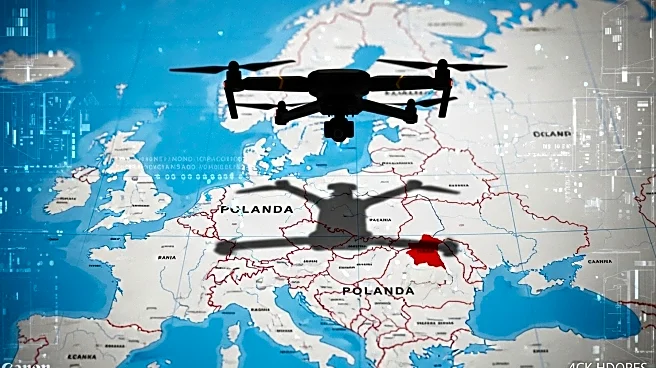What is the story about?
What's Happening?
In September 2025, a significant incident occurred when multiple Russian drones entered Polish airspace, marking one of the most severe breaches into NATO territory. This event has sparked considerable concern among European nations, particularly those bordering Russia. The drones, part of a broader strategy of 'hybrid warfare' by Russia, were reportedly shot down, but not before causing alarm and raising questions about the adequacy of current defense measures. This incursion is part of a series of similar incidents reported across Europe, including in Germany, the Baltic, and Nordic countries, often targeting critical infrastructure such as power plants and military bases.
Why It's Important?
The drone incursions underscore the vulnerabilities in NATO's defense systems and the challenges of responding to non-traditional warfare tactics. These actions by Russia are seen as attempts to destabilize the region and test the resolve of European nations. The incidents have heightened public anxiety and put pressure on European leaders to enhance security measures. The situation also highlights the need for a coordinated response among NATO members to address these unconventional threats. The incursions could potentially embolden Russia to further test NATO's defenses, posing a significant risk to regional stability.
What's Next?
European leaders are currently grappling with how to respond effectively to these incursions without escalating tensions further. Discussions are underway about implementing more robust countermeasures, including the possibility of a 'drone wall' for detection and interception. However, there are divisions among EU leaders on the best course of action, with some countries feeling neglected in the broader security strategy. The situation calls for a delicate balance between demonstrating strength and avoiding unnecessary provocation, especially given the nuclear capabilities of Russia.
Beyond the Headlines
The drone incursions are not just a military concern but also a psychological tactic aimed at undermining public confidence in government and democratic institutions. By creating chaos and fear, these actions could lead to increased support for autocratic governance models. The incidents also highlight the importance of public communication and preparedness in managing such threats, drawing lessons from past crises like the pandemic. European nations may need to adopt strategies from Baltic and Nordic countries, which have been more proactive in addressing similar threats.

















